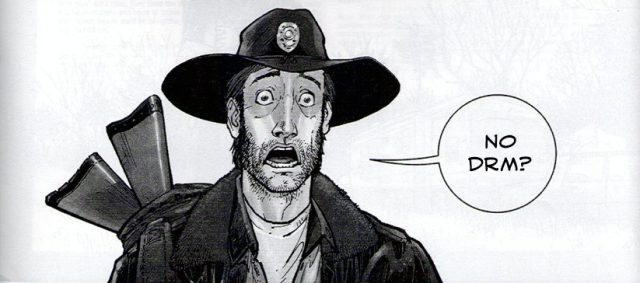
Yesterday, publisher Image Comics threw a media event in San Francisco. It brought in some authors (notably Robert Kirkman, creator of The Walking Dead, even though they spelled his name "Roberk" on the official site), dropped a couple of announcements, and mixed it up with the press and fans. Standard stuff.
Maybe you're already an Image Comics fan. It would be understandable—Image is the third largest comics publisher behind industry behemoths Marvel and DC. And its model of creator-owned works certainly doesn't put it at the back of the pack when it comes to creativity. If you're looking for a series about a detective who solves crimes using his psychic impressions from eating things (John Layman's Eisner Award winning Chew), Image is your go-to spot.
But even if you don't read comic books, it's worth sitting up and paying attention to Image's big announcement at the show. Starting now, the publisher is going to sell its digital comic books through its website utterly DRM-free. PDF, EPUB, or comic reader formats CBR and CBZ (basically just zipped or RAR'd collections of JPEGs) are all yours to keep, back up, and read on your device of choice, however you see fit.
If you're not familiar with the world of big digital publishing, it works a bit like this: you can generally get digital versions of comics the same day they're released to brick-and-mortar stores, either through a subscription or a specialized app. Now when I say "get," I don't really mean "buy." Yes, money is leaving your bank account and going into the publisher's (with maybe a cut going to a middleman like Comixology), but the reality is that you're just renting the content. You buy a license to view the comic—you don't actually own it. Want to read it outside of the app you bought it from? Good luck with that.
Not everyone lives near a comic store. Not everyone wants to store boxes and boxes of tree pulp. Buying digital is handy. But when you buy a paper issue, you own it. If a server goes down or you switch to a new device without supported apps, the comics won't vanish on you. So it's not hard to see why DRM-free is a win for consumers. When isn't it?
But why should you care if you don't read comic books? Because any time a major distributor of content addresses the elephant in the room—namely piracy—consumers have a chance to advance the conversation.
The comic piracy scene is thriving. Even before publisher-released digital issues were put out the same day as print copies, pirates armed with flatbed scanners were putting scans online as fast as collectors could slide unread issues into poly bags. Now they can skip the scanners and just take high-rez screencaps of digital comics. No wait, no DRM, no cost. It's easy to find if you know where to look, and it's almost impossible to shut down.
DC and Marvel surely know this just as well as Image, but Image was the first publisher to pull its head out of the sand to actually address the situation in a real-world way. Wired interviewed Image Comics publisher Eric Stephenson about the DRM-free announcement, and he was refreshingly forward-thinking about what piracy really means for his industry:
My stance on piracy is that piracy is bad for bad entertainment. There’s a pretty strong correlation with things that suck not being greatly pirated, while things that are successful have a higher piracy rate. If you put out a good comic book—even if somebody does download it illegally—if they enjoy it, then the likelihood of them purchasing the book is pretty high. Obviously we don’t want everybody giving a copy to a hundred friends, but this argument has been around since home taping was supposedly killing music back in the ’70s, and that didn’t happen. And I don’t think it’s happening now.
DRM tends to simply punish the people who pay for things. The comic pirates aren't suffering; they're arguably getting a superior version of the product compared to people who put down the cash. So why is it so hard to get publishers to admit that they can't stop piracy and that by embracing the pirates, however at arm's length, they can grow their business? Like our comic you pirated? Buy the next issue and support the author! We'll make it as easy and convenient as that pirated copy. Read it however you like—it's yours.
Image is number three in its industry, so it isn't leading the pack here. DC and Marvel are probably busier thinking about movie rights and media empires than they are about making comic books and shaking things up. I wouldn't expect anything to change overnight. But if you're thinking about buying some comics, consider taking Image's bold experiment for a spin. Support DRM-free publishing. Hopefully we're heading toward a future where instead of being bold, it just seems obvious. It happened with iTunes music; maybe comics are next. After that, we can set our sights on eBooks. Hollywood? Well, we can dream, can't we?
reader comments
69